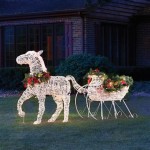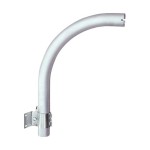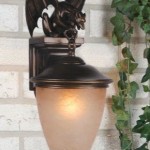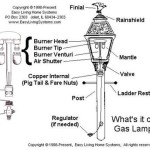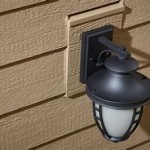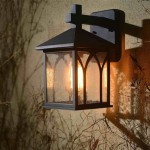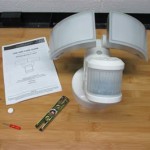Tudor Revival Outdoor Lighting
Tudor Revival architecture, with its charming blend of medieval and Renaissance influences, continues to captivate homeowners. A crucial element in enhancing the authenticity and curb appeal of these homes lies in the careful selection of outdoor lighting. Choosing fixtures that complement the architectural style is essential for creating a cohesive and aesthetically pleasing exterior. Tudor Revival outdoor lighting embraces specific design elements that echo the period's aesthetic, contributing significantly to the overall impression.
Material and Finish
Authenticity in Tudor Revival lighting hinges on the appropriate selection of materials and finishes. Wrought iron, with its handcrafted appearance and inherent durability, is a cornerstone of the style. The dark, textured finish of wrought iron evokes a sense of age and complements the weighty presence of Tudor architecture. Copper and brass are also suitable choices, offering a warmer tone and developing a rich patina over time. The finishes should reflect a weathered or antique look, avoiding overly polished or shiny surfaces. Lantern-style fixtures often incorporate seeded or textured glass, which diffuses light softly and enhances the period feel.
Shape and Silhouette
The distinctive shapes and silhouettes of Tudor Revival lighting fixtures play a significant role in conveying the architectural style. Common forms include hanging lanterns, wall sconces, and post lamps, each exhibiting characteristic design elements. Lanterns frequently feature a cage-like structure surrounding the light source, reminiscent of medieval torches and offering a sense of history. Wall sconces may incorporate arched tops or decorative backplates, reflecting the architectural details found within the home. Post lamps typically exhibit a more substantial presence, often with multiple tiers or elaborate finials, adding to the grandeur of the entranceway.
Placement and Functionality
Strategic placement and thoughtful consideration of functionality are essential aspects of Tudor Revival outdoor lighting. The goal is to illuminate the architectural features, enhancing their beauty while providing practical safety and security. Positioning fixtures to highlight the textured surfaces, decorative half-timbering, and prominent gables accentuates the home's character. Illuminating walkways, entrances, and driveways ensures safe passage while maintaining the historical aesthetic. The scale of the fixtures should be proportionate to the size of the house and surrounding landscape, avoiding overwhelming the overall design. Subtle, downward-facing lighting minimizes light pollution while effectively showcasing the architectural elements.
Common Tudor Revival Lighting Styles
Several specific lighting styles resonate particularly well with Tudor Revival homes. The "coach lantern" style, with its characteristic caged frame and often hexagonal shape, evokes a sense of carriage entrances and historical charm. "Pendant lights" suspended from chains or brackets offer an elegant solution for porch areas or covered entryways. "Wall-mounted lanterns" flanking the front door provide both illumination and a decorative touch, framing the entrance effectively. "Post lamps" with a substantial base and ornate detailing create a stately presence along driveways or pathways, enhancing the grandeur of the property.
Integrating with Landscaping
Outdoor lighting should seamlessly integrate with the surrounding landscaping, enhancing the overall curb appeal. Positioning fixtures within flowerbeds or near shrubs can create a dramatic effect, highlighting both the plants and the architectural features. Downward-facing lights placed beneath trees can cast interesting shadows and create a sense of depth in the landscape. Care should be taken to avoid overlighting, which can detract from the natural beauty of the surroundings. The lighting design should complement the landscaping, creating a harmonious and inviting outdoor space.
Maintaining the Historical Aesthetic
Maintaining the historical aesthetic requires careful attention to detail. Avoiding anachronistic elements, such as overly modern or minimalist fixtures, is crucial. Opting for fixtures that reflect the craftsmanship and materials of the Tudor Revival period preserves the authenticity of the design. Researching historical examples and consulting with lighting specialists knowledgeable in period styles can be invaluable in making informed decisions. The goal is to create a cohesive and historically sympathetic exterior that reflects the architectural heritage of the home.
Energy Efficiency and Modern Technology
While maintaining a historical aesthetic is paramount, incorporating modern technology and energy-efficient practices is also a valuable consideration. LED bulbs offer a long-lasting and energy-saving alternative to traditional incandescent bulbs while providing comparable light output. Motion sensors and timers can further enhance energy efficiency and security. These modern advancements can be seamlessly integrated into Tudor Revival lighting fixtures, allowing homeowners to enjoy the beauty of traditional design while minimizing their environmental impact.
Portfolio Outdoor Lighting For A Period Tudor Expansion Brass Light Gallery Milwaee Wisconsin 53233
Olde English Tudor Lighting Quality Handcrafted Light Fixtures
Olde English Tudor Lighting Quality Handcrafted Light Fixtures
Cottage Style Lanterns Bevolo
My Old English Tudor House The Inspired Room Exterior Light Fixtures Entrance Lighting
Tudor Style Column Lights Old Lighting By Exterior Series Annandale 1000 6
English Tudor Style Outdoor Lights Photos Ideas Houzz
Lantern 7 In Wide Scrolled Hook Exterior Wall Light Brass Gallery Milwaee Wisconsin 53233
Gothic Pendant 1926 Tudor Revival Rst 5737
Lantern 8 In Wide Curved Arm Exterior Wall Light Brass Gallery Milwaee Wisconsin 53233
Related Posts

